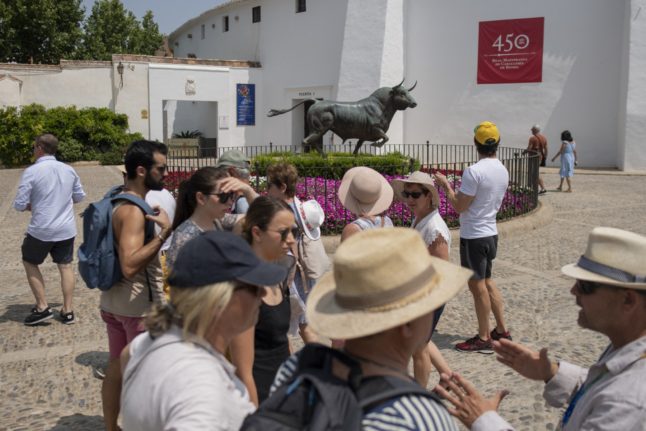Spain’s Transport Minister Óscar Puente has launched an attack against low-cost train company Ouigo in claims that they undercut other companies. Puente has said he is even considering filing a complaint with Spain’s National Markets and Competition Commission (CNMC) about a pricing policy he describes as “tremendously unfair.”
Ouigo, a French-owned company, is one of several high-speed rail companies operating in Spain since greater market liberalisation was introduced in recent years and the market was opened up to competition.
The company offers long-distance, high-speed rail fares for as little as €9 one way and a flat €5 rate for children under 14 years old.
Puente’s attack, which is the latest in a series against the company, comes amid a nationwide expansion by Ouigo.
In the second half of 2024 Ouigo plans to expand into the huge southern region of Andalusia, with routes covering Seville, Málaga and Córdoba, as well as increasing its presence on the Mediterranean coast with stops in Elche and Murcia on a line that will link to Valladolid, passing through Madrid.
READ ALSO: Low-cost Ouigo to expand train services in Spain’s Andalusia and Murcia
This follows news earlier in the year that Ouigo would also begin stopping in cities such as Valladolid and Segovia.
Though cheap train travel would appear to complement the left-leaning Socialist (PSOE) and Sumar government coalition’s progressive agenda, particularly on environmental measures, Puente’s main concern with Ouigo seems to be its effect on Renfe, Spain’s state-owned railway company. “By protecting Renfe, I am protecting all rail transport,” he said over Easter.
According to the CNMC, the arrival of high-speed competition has reduced ticket prices by up to 40 percent compared to when Renfe was the only operator. On the Madrid-Valencia route, for example, Ouigo is the cheapest option despite price cuts from its competitors.
As of the end of 2023, its average fare was €21.31, followed by Renfe’s low-cost high-speed service Avlo at €21.80, Italian-owned Iryo at €22.76, and finally AVE, Renfe’s main high-speed service, significantly higher at €36.64.
However, Puente suggests that such low prices could have a negative impact on the financial sustainability of all train companies.
Ouigo, the Minister argues, cannot cover its own costs with such cheap tickets, as demonstrated by the fact that since its arrival in Spain three years ago it has made annual losses of €40 million, which are covered by its parent company, the French state railway company SNCF.
On the other hand, cutting prices puts pressure on Spain’s other high-speed rail operators – Iryo and Renfe’s AVE and Avlo – to follow suit in order to maintain market competitiveness, which in turn could have negative impacts on their sustainability.
Similarly, whereas Ouigo only competes in the high-speed rail market, Renfe offers several different types of service, including local and medium-distance trains, so any negative impacts on the state-owned company could plausibly also be felt on non-high speed rail services too.
READ ALSO: Which cities in Spain will get Avlo low-cost rail services in 2024?
Ouigo, for its part, defends its presence in the Spanish market as a model “based on the volume”.
The French company points to CNMC data showing the drop in prices caused by free competition has meant that last year Renfe, Ouigo and Iryo all had an average train occupancy rate of 90 percent.
On the price controversy, Ouigo states low-prices are “a characteristic” of its industrial model, based on an economy of scale owing to its double-decker trains that can carry up to 509 passengers. Lowering prices are done with the aim of “democratising high speed” rail, the company claims, by bringing to Spain a business model that has carried 100 million passengers in a decade in France.
But Puente and the Spanish government are not entirely against the free market, and see positives on Spanish railways since it was opened up to greater competition.
“Rail liberalisation has brought positive things, obviously it has increased supply, it has reduced prices,” Puente said. “But it has reduced them to a level that’s unsustainable for the three competitors. Competition has to allow the three companies to make profits or, at least, not to make losses.”
Ouigo, the Minister says, “will have to raise its prices.”
Pricing is not the only problem some in Spain have with high-speed rail. Spain has the most high-speed rail in Europe in terms of total kilometre coverage, and the second most in the world.
However, critics argue that the massive expansion of high-speed rail services in Spain is not evenly distributed and has been overly focused on urban centres, leaving many parts of the country disconnected from the rest or with the need to take connections via Madrid.
READ ALSO: Thousands protest to demand return of Spain’s old western train line



 Please whitelist us to continue reading.
Please whitelist us to continue reading.
Member comments